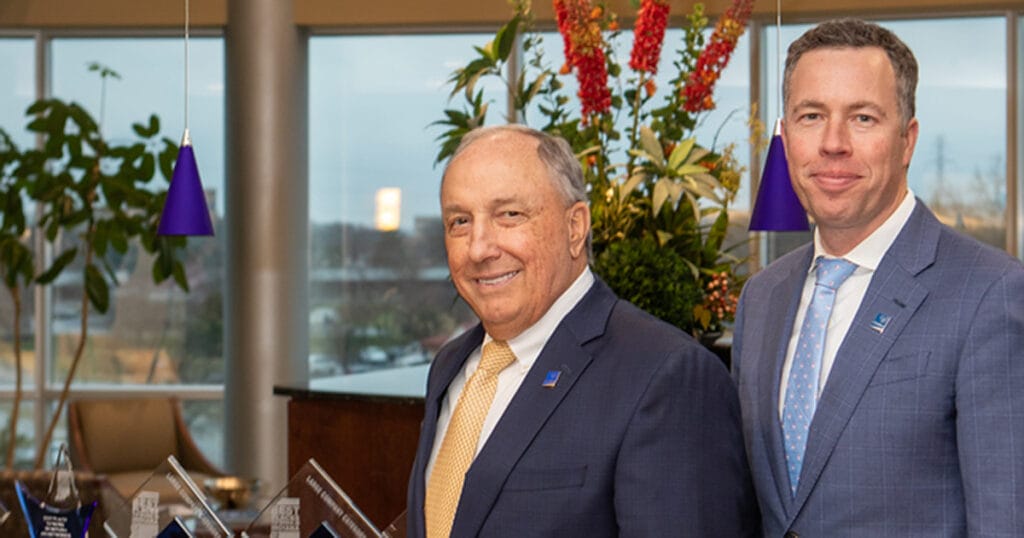Local banks prosper even in tough economic times.
by Michael Puente
For the all the negative national economic news surrounding underwater mortgages, foreclosures and companies that can't secure loans for new initiatives, Northern Indiana as a whole isn't fairing too badly and is actually doing much better than other parts of the country.
That's according to bank honchos who serve the region from Hammond to South Bend. That being said, there is still much uncertainty in not only the local economy but nationally, as whoever wins the White House sweepstakes will play a big role in how the country moves forward and will try to steer the country out from these economic doldrums.
But for some of the region's banks, they've managed not only to stay above water, but prosper in what have been otherwise tough economic times.
“We have been very lucky in being able to maintain our net interest margins over the last several years. We've also had good cost control as well,” says Larry E. Lentych, the retiring treasurer and chief financial officer for the South Bend-based 1st Source Bank. “Actually, 2011 was a record net income year for us.”
Lentych says the bank, which serves Northern Indiana and Southern Michigan, reported $48.1 million dollars in net income, compared to $30.5 million in 2007 at the start of the recession. According to Lentych, 1st Source Bank is able to stay in solid financial footing by having a diversified loan portfolio. In fact, about half of the bank's loans go to the transportation industry.
“We are financing aircraft, tractor-trailers, rental car fleets, funeral cars, trash trucks and road building,” Lentych says. “We have a diversification of various products lines, but also a geographic diversification as well, on our income stream. We have been very lucky in being able to maintain our net interest margin, which is the major source of revenue for most banking organizations.”
Lentych has seen a lot of changes in the banking industry over the last 38 years. He'll be retiring at the end of the year. But even with all his experience, it's difficult for him to predict what will happen with the economy. “There's a lot of uncertainty and uncertainty causes inertia. If you have inertia that means people are theoretically not investing and not hiring.”
Home lending in Northwest Indiana is stable this year, says David A. Bochnowski, chairman and CEO of the Munster-based People's Bank. Bochnowski says Northwest Indiana didn't see its housing market bubble burst as happened in other parts of the country, such as Florida and parts of the Southwest.
“We've had pretty good growth. Consumer confidence is returning,” Bochnowski says. “Whether it's business or consumer, we've had pretty good growth.”
He says the bank is seeing some new construction in Northwest Indiana, which he says is always a good sign of a recovering economy. As far as People's Bank as an institution, Bochnowski says the bank's had internal growth and opened new banking centers in a few locations.
As far as the future, Bochnowski says that is always hard to predict. “I think the economy has a mind of its own.”
Craig M. Dwight, president and CEO of Michigan City-based Horizon Bank, says his bank has seen record earnings for 12 straight years, with the first six months of 2012 no different.
“We've survived the recession very well and continue to show growth every single year,” Dwight says. “I think it's our business model. We don't put all our eggs in one basket. We are strong mortgage lenders for residential housing. We have a good business banking group, good consumer loans group specifically for car loans and home equity loans. Then we have wealth and investment management. Those different business lines complement each other. Because of that, we're able to maintain pretty stable earnings even during a downturn in the economy.”
The business climate, even as the economy continues to show slow growth, means good news for consumers, especially those looking for a loan, Dwight says.
“Banks do not make money or return a profit to shareholders unless they are making loans. The banks want to make loans. All community banks do,” Dwight says. “The good thing for borrowers today is with the economy not growing, there are fewer borrowers out there than there were before so the demand for borrowers, from a bank's perspective, is greater so there's better pricing that can be passed along to the loan applicants. You're seeing that in the mortgage loans and commercial lending areas specifically as a whole.”
Dwight doesn't see the economy picking up in growth anytime soon, with inflation a real threat given the Federal Reserve announcing in September that it will expand its holdings of long-term securities with purchases of $40 billion of mortgage debt a month as a way to boost growth and reduce unemployment.
“I don't see anything being robust going forward. I see slow growth, 1 to 2 percent at best. There's a risk of inflation coming down the road with the new Fed policy,” Dwight says. “There's just a lot of uncertainty. I don't see a lot of rapid growth for a while and it may be another four or five years out before we see it.”
Craig Pratt, senior executive for Fifth Third Bank's Northern Indiana operations, says the bank has seen pretty steady growth in the region over the last two years. During that time, the bank has expanded its presence in Northwest Indiana, opening banks or bank-marts in Hammond, Portage, Munster and near the Westfield Southlake Mall in Hobart.
“Mortgages have really worked out great for us, obviously with record low rates,” Pratt says. “With housing in Northwest Indiana a little bit less expensive than in Illinois, we've seen steady decrease in population in people who were in Illinois.”
Pratt says for Northwest Indiana, he sees blue skies ahead.
“I think we'll continue to do well. I don't know if we're going to jump to great growth,” says Pratt, who is on the board of directors for the Northwest Indiana Forum, based in Portage. “The Forum is really working to bring businesses in here. We have such great assets. We have a port, railroads, a great highway system and we're right next to one of the greatest cities in the world. There's a high quality of life that's available in Northwest Indiana.”
In September, Michael E. Schrage, president and CEO of the Merrillville-based Centier Bank, celebrated his 40th anniversary with Indiana's largest privately-owned bank, which was named one of the best places to work in Indiana for the past six years.
Schrage is the fourth generation of his family to own and manage Centier Bank, which was founded by his great-grandfather, Henry Schrage, as the Bank of Whiting in 1895 and helped build the “City by the Lake.”
Mike Schrage's own banking career began in 1972, when he joined the bank as a loan and investment officer after graduating from college.
Overall, Schrage says most banks in Northwest Indiana are doing well primarily because the region escaped much of the financial turmoil that other areas of the country experienced.
“I've been pleasantly surprised by the gradual rebirth of homebuilding, and even the developers have seen some lot sales,” Schrage says. “Certainly the upcoming election is a major factor, as well as the international situation in Europe. That can throw a wrench in plans very quickly. But it's hard to project at this point until we get through the political decisions in November.”
Schrage says that even though the nation's economic recovery doesn't feel like one, there is renewed activity, especially throughout the region.
“We have some activity going on. That activity is noticeable especially on the main thoroughfares. You see dump trucks, cranes. Nobody was moving dirt but now you see a lot of semi-truck activity, much more than we saw the last three years. Certainly the opportunity is there for sustained gradual improvement. We're positive as far as the local economy. I think the worst is behind us but we don't know how slow the growth is going to be.”
Daryl Pomranke, CEO of Munster-based Citizens Financial Bank, says his bank is seeing the entrepreneurial spirit coming out for a lot of new or existing small business owners.
“For some of our entrepreneurs, their playing field of competitors has diminished as a result of others failing. They are feeling a little better. There is the capacity for need out there in the market, a demand, someone is going to have to fill it. There are some brave people out there who feel this is the new normal and they are going to live within it.”
Of course, the current sluggish economy is causing uncertainty, especially for those in the middle class, Pomranke says.
He says regardless of who wins the White House, it could take as long as six months to determine the policy moves that a re-elected President Obama or a new Romney administration will take. “When Obama came in four years ago, it took him up to six months just to put a cabinet in place.”


